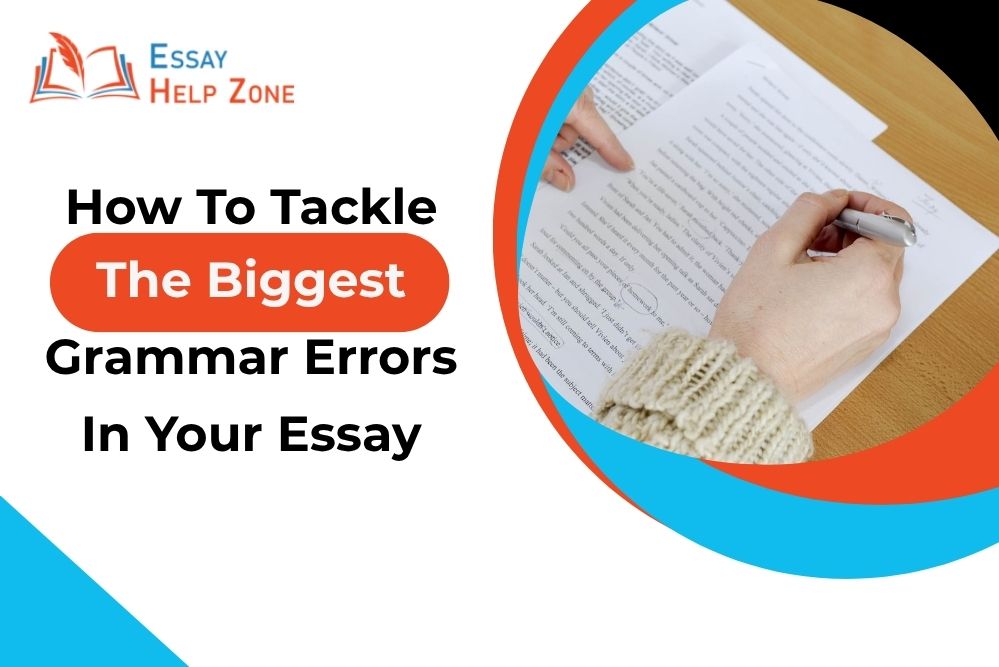Grammar is the foundation of your writing. It’s how you communicate your message clearly and precisely. Correct use of grammar and syntax is essential if you want to get an A on your essay!
When it comes to writing your essay, there are some things you can do to ensure that your writing is as grammatically correct as possible. This is important because the way you use language in your essay will determine whether or not you get a good grade.
To provide you with our essay help online UK, we’ll show you how to tackle the biggest grammar errors in your essay and write more effectively in this blog. So, let’s start!
How To Tackle The Grammatical Errors In Your Essay?
One of the first things you should do when you have completed your essay is proofread it. You can start by reading your essay out loud. This will help you to identify any grammar mistakes that you may have made and allow you to correct them before it’s too late!
Proofreading is essential for any writer and can help ensure that your essay is error-free. The more you proofread your paper, the less likely you are to make these mistakes. Despite how much time and effort it takes to undertake a thorough edit on every sentence in an essay or paper, it’s well worth doing this step of your writing process because:
- It will reduce the chance of making an embarrassing mistake when submitting your work.
- It can save your grades from going down.
- It helps give your essay a more professional touch without any professional essay help.
The Biggest Grammatical Mistakes You Need To Look For In Your Essay
When you’re writing a paper, it’s important to keep in mind the rules of grammar. Otherwise, you might end up with an essay that’s full of grammatical errors and awkward sentences. Here are the biggest grammar errors that you need to watch out for:
Misspelling
This is one of the easiest mistakes to make! It happens when you spell something wrong and don’t know it. If you’re writing an English essay and misspell “its” or “it’s,” then your reader will have a hard time understanding what you’re trying to say—and that could ruin their experience with your essay.
There’s nothing worse than using an incorrectly spelled word in your writing. So make sure to go back through your essay and check for spelling errors. Spelling mistakes can be difficult to spot, especially if they’re small or made in common words like “there” or “their.” If you’re not sure how to spell a word, use an online or old-school dictionary or take marketing essay help online UK.
Misuse of Words:
This is when someone uses a word incorrectly for its intended meaning. For example, if I used “it,” instead of saying “this,” then my teacher would think that I was talking about something else entirely!
Misspellings are a common mistake. It can be hard to spot them, and they can make you look unprofessional or amateurish. If you want to make sure that you’re not making any spelling mistakes, there are two things you can do. One is to make sure you know how to use words correctly and in the right context so that your meaning is clear and precise. If you don’t know how to use a word correctly, then it’s best to look up its meaning and usage in the dictionary before writing an essay help online UK.
Second, run a spell-check on your document, especially if you are writing on a computer. Most word processors and text editors have a spell-check feature that will catch common misspellings and tackle the biggest grammar errors. If not, there are plenty of free online tools available that can help you quickly check for errors in your writing.
Subject-Verb Agreement
Subject-verb agreement is the act of ensuring that your subject and verb are both singular or plural. It’s important for essay help online UK to know whether a sentence is singular or plural because you can’t create an error in this area if you do not know what kind of number it should be.
This is one of the most common errors in English and can be corrected by simply paying attention to the number of the subject. This rule is most commonly violated when we use a plural pronoun with a singular noun or vice versa. For example: “Each student must bring their own books.”
This sentence is incorrect because the subject “each student” is singular, while “their own books” is plural. There are several ways to correct the error. You could say: “Each student must bring his or her own book.” Or you could rewrite the sentence altogether: “Students must bring their books.”
Unclear/Misplaced Modifiers
Modifiers are words or phrases that describe other words. They’re important because they help us to make our sentences more detailed and descriptive. They can make a sentence’s meaning clearer, make a sentence more specific, or simply make it more engaging. This is why professional writers of essay help online UK recommend using modifiers in your essay.
However, one of the biggest mistakes that students make is using too many modifiers at once or placing them wrongly. It’s not just about being concise—it’s also about making sure your writing sounds natural and flows well. If you’ve got lots of words in your writing and they don’t seem to add anything meaningful, then you probably have too many modifiers on your page!
Passive Voice
The passive voice is used to avoid responsibility, objectivity, and directness. you should avoid using too many passive sentences in your essay because they can make your writing sound a bit dull and hard to follow. Passive sentences also make your writing sound weak, unclear, and indirect. Instead, essay help online UK suggests, using the active voice to make your sentences stronger, more direct, trusted value.
In this sentence: “The results were presented by the author”, which means that there was an agent (the author) who presented the results and not just some unknown person performing this task for them. In contrast, in the next sentence: “The Author presents the result.”
This sentence is more direct, specific, and objective. It names the agent (the author) clearly, there is no need to guess who is responsible for this action.
Punctuation Errors
Punctuation errors are one of the most common problems in essays. They can make your writing look sloppy, or worse: they can confuse readers and reduce their confidence in what you’re saying.
Here are some ways the essay help online UK experts avoid punctuation errors:
- Use a comma to separate two independent clauses. If one clause begins with “and,” “but,” “or” or another word that ends with a period, use a comma before the second clause.
- Use a semi-colon to separate independent clauses with a conjunctive adverb. A conjunctive adverb connects two independent clauses in such a way that they form one idea. For example: “I went home from school immediately after class; however, I had homework to do.”
- Use quotation marks to indicate that you are using someone else’s exact words. Do not use quotation marks unless the source is directly quoted. If there is no direct quote, then do not use quotations.
Homophones
Homophones are words that sound the same but have different meanings. For example, “there” and “their,” or “about” and “above.” They’re commonly confused with each other, used in place of each other, or used as puns.
The commonest examples of homophones are:
- there, their, and they’re (they are)
- your and you’re (you are)
- to, too, two, and to.
when you are proofreading your essay, make sure that all your homophones are used correctly in your essay help online UK. It’s also important to avoid using them as puns unless you’re writing a comedy essay.
End Note
Grammar is a part of the English language that’s not always easy to master. We all make mistakes, but we can learn how to avoid them and make sure our writing is as clear and readable as possible. The only way to ensure that all of your grammar is correct is by reading through your essay several times before submitting it. The more you proofread your paper, the less likely you are to make these mistakes. We hope this post has been helpful to you. If you have any questions or comments or need compare and contrast essay help online UK please feel free to reach out to us!




